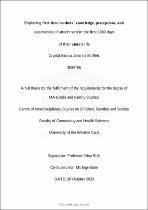| dc.contributor.advisor | Rich, Edna | |
| dc.contributor.author | Stoffels, Crystal Bianca Johanna | |
| dc.date.accessioned | 2024-04-04T10:14:15Z | |
| dc.date.available | 2024-04-04T10:14:15Z | |
| dc.date.issued | 2024 | |
| dc.identifier.uri | http://hdl.handle.net/11394/10712 | |
| dc.description | >Magister Scientiae - MSc | en_US |
| dc.description.abstract | The first 1000 days (FTD) of an infant’s life is a delicate period where rapid growth and development takes place in all domains, namely cognitively, socially, physically, and emotionally. The period fromconception to the age of two years is termed the “first 1000 days” (FTD). During this crucial period, the primary caregiver(s) plays an essential role in creating a secure environment to ensure that children thrive and reach their fullest potential. Therefore, this study aimed to explore first-time mothers’ knowledge, perceptions, and experiences of attachment in the first 1000 days of their child’s life. The study was guided by the attachment theory of John Bowlby and Mary Ainsworth, which is based on the notion that a child’s first attachment experience (initially to the mother) profoundly shapes the social, cognitive and emotional development that follows. A qualitative methodological framework with an exploratory descriptive research design was utilised in this study. | en_US |
| dc.language.iso | en | en_US |
| dc.publisher | University of the Western Cape | en_US |
| dc.subject | First 1000 days | en_US |
| dc.subject | Attachment | en_US |
| dc.subject | Nutrition | en_US |
| dc.subject | First-time mothers | en_US |
| dc.subject | Nurturance | en_US |
| dc.title | Exploring first-time mothers’ knowledge, perceptions, and experiences of attachment in the first 1000 days of their child’s life | en_US |
| dc.rights.holder | University of the Western Cape | en_US |

